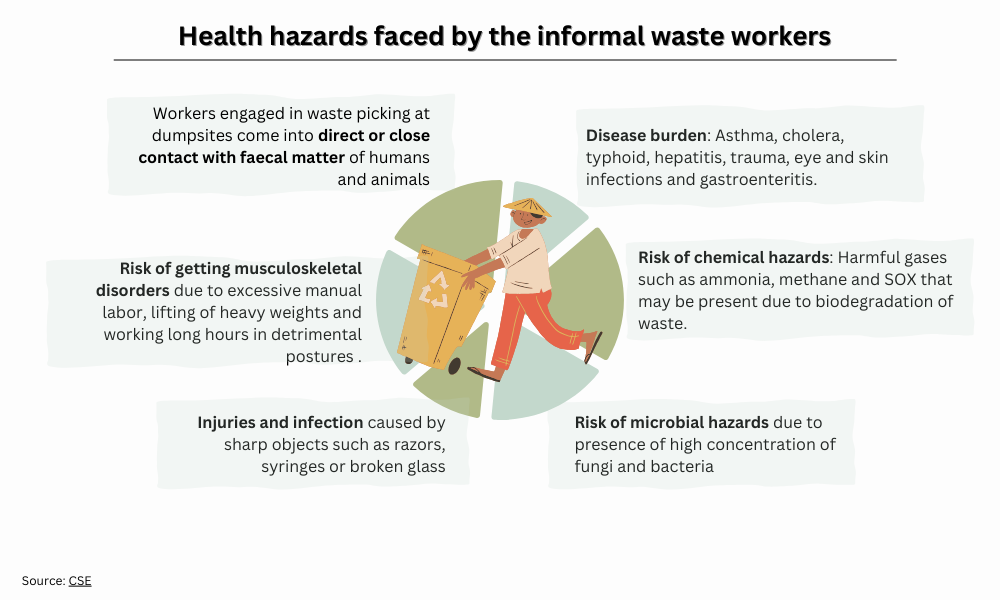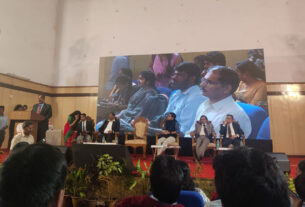Bangalore was the first city in the country to introduce occupational ID cards for waste pickers in 2011.
A survey to identify waste pickers for the renewal of old occupational identification (ID) cards and the distribution of new ones will be conducted in 2024, said Rohini, communication manager at Hasiru Dala, an organization working with waste pickers and waste workers in the city.
Occupational ID cards for waste workers were issued by Bruhat Bengaluru Mahanagara Palike (BBMP) in 2011 with a validity of ten years. However, the process of renewal has not yet started. Murali Mohan, Assistant Engineer, Solid Waste Management (SWM) in BBMP, said that they have received applications for renewal of occupational IDs for waste pickers, but the process of renewal has not yet begun.
BBMP is the first urban local body in the country to issue occupational IDs to waste pickers in association with Hasiru Dala. A survey was carried out by the organization in 2011, on behalf of BBMP. A total of 8000 ID cards were distributed in Bangalore and a total of 12,000 in Karnataka, between 2011 and 2020, said Rohini.
In 2016, the Ministry of Environment, Forests, and Climate Change under the Government Of India, introduced the Solid Waste Management (SWM) Rules, which require local authorities to establish a framework for identifying organizations of informal waste pickers and introduced the provision of Occupational ID cards.
Murali added that the implementation of this identification system has provided organization and structure to the previously unorganized waste pickers in the city.
A. Krishna, operator of Domlur Kartavya Dry Waste Collection Centre (DWCC), started waste picking in his childhood. He was one of the many waste pickers who received an occupational ID in 2011. “Many people in my community, who are involved in waste picking don’t own a house. Many of them lack any sort of identification. Occupational ID serves as a proof of identity for us,” he said.
Access to occupational IDs helps them apply for various government schemes related to waste workers, said Rohini.
Krishna mentioned that the ID was beneficial in securing a Mudra Loan for himself.Similarly, amid the COVID-19 pandemic, the card played a pivotal role in enabling the community to access various health services.” During the COVID, numerous waste pickers could access healthcare services that mandated an identification card by presenting the waste picker’s ID,” he said.
He also pointed out that the card could be utilized to avail various treatments at Government hospitals.
Moreover, not all waste pickers in the city are informed about these identification cards. Murugan, a waste picker who migrated from Tamil Nadu, was unaware of the occupational IDs, altogether.
Chinnaswamy, a waste picker from Kengeri had a similar opinion. He thought that these IDs were exclusively given to Pourakarmikas by the BBMP and was unaware of the availability of IDs for informal waste workers.
Nevertheless, it is important to note that not all occupational ID cards have expired, only about 3000 cards that were distributed between 2011 and 2014 have been affected, she added.
Rohini confirmed that a survey would be carried out by Hasiru Dala this year. This would involve identifying all eligible waste pickers in the city, including those who previously had an ID card and reside in Bangalore, individuals who have migrated to the city and taken up waste picking, and those with IDs who are either no longer engaged in waste picking or no longer a resident of the city.
Informal waste workers
A 2021 research paper by the Centre for Science and Environment mentions that nearly 0.15 million tonnes of Municipal Solid Waste are produced in urban India every day.
It further mentions that in many developing countries including India, waste collection and material recycling activities are mainly performed by informal waste workers. The engagement of the formal waste management sector remains low, due to insufficient funds, lack of legal guidance, low sectoral development, and lack of tacit know-how about sustainable waste management practices.
Another research paper by the Penn Institute for Urban Research (Penn IUR), mentions that waste pickers in Bangalore, have to work in hazardous conditions with no safety equipment putting their health and safety at risk.

Waste pickers in Bangalore are predominantly migrants from various regions of the country, often lacking proper identification. This puts them at a risk of discrimination and harassment in society, said Satheesh, project manager at Sahaas, a non-profit organization working in the field of waste management.
Waste pickers are often perceived suspiciously by the police as they roam around the streets with their bag in which they collect recyclable waste materials. Access to the occupational ID allows them to produce the same before the police in situations of suspicion and doubt, she added.
Most waste pickers are from marginalized sections of society and are often forced out of other jobs, Rohini added. “Occupational IDs provide waste pickers legitimacy in the social sphere,” she said.
Dr. M. Lokeshwari, Solid Waste Management expert and Associate Professor of the Civil Engineering Department at RV College,said, “We can call waste pickers, ‘waste ambassadors’ as they are the ones who work towards the process of recycling.”
Dr. Lokeshwari further mentioned that recycling reduces the dependency on virgin materials. “By collecting potential recyclable materials and selling them to recyclers at minimal prices, waste pickers contribute in sending back such materials to the original recycling facility,”she added.




